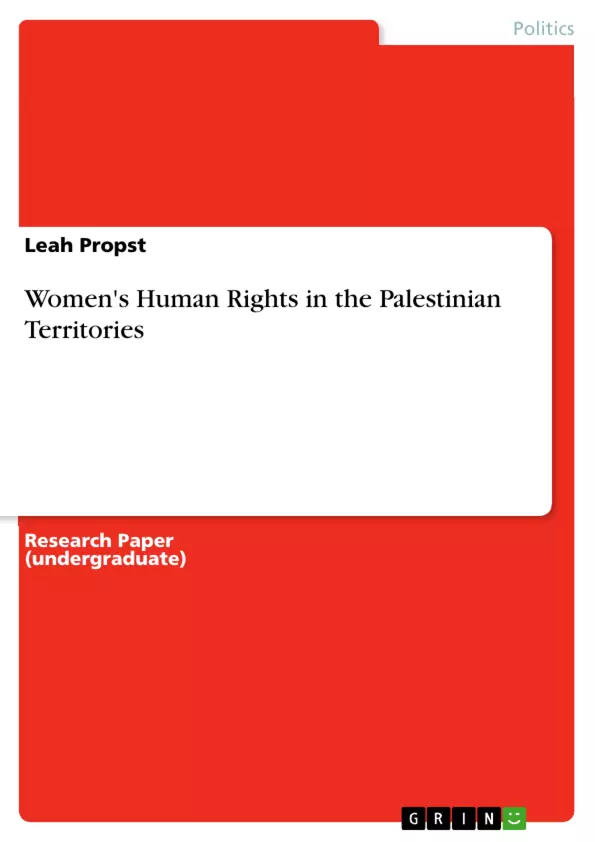Women have struggled and continue to struggle for equal rights in virtually every nation of the world. In areas such as education, occupational opportunities, reproductive rights, freedom of movement, political participation, and healthcare, many women around the globe face limited options and social and political restrictions that are difficult if not impossible to overcome. These difficulties are uniquely apparent in the Palestinian Territories, where a complicated geopolitical situation exacerbates the traditional limitations on the rights of Middle Eastern women.
The volatile living conditions in Palestine create issues regarding women's human rights. Limited mobility and lack of access to essential resources make it difficult for women to access adequate healthcare. Daily violence and social norms create barriers in education for girls and women in the Territories. The representation of women in the civic community is minimal due to women's lack of participation in political life. And domestic violence flourishes due to legal and social norms that are exacerbated by the ongoing conflict with Israel. Women's access to the legal system and justice, already made difficult by the Sharia Law under which Palestine operates, is even more complicated when day-to-day life itself may make society unconcerned with accusations of rape and domestic violence. The following research merely scratches the surface of the complex sociopolitical system under which the women of Palestine live.
Inhaltsverzeichnis (Table of Contents)
- Introduction
- Healthcare
- Pre-marriage medical tests.
- Care for women, especially pregnant women.
- Support for natural breastfeeding.
- Monitoring child growth and development.
- Making family and society aware of child care services and protections.
- Education
- Political Participation
- Domestic Violence and Access to Justice
Zielsetzung und Themenschwerpunkte (Objectives and Key Themes)
This research investigates the unique challenges faced by Palestinian women in the areas of healthcare, education, political participation, and access to justice. The research aims to shed light on the complex interplay between socio-political factors, including Israeli occupation, patriarchal societal norms, and discriminatory laws, that contribute to the systematic marginalization and human rights violations faced by Palestinian women.
- The impact of Israeli occupation on Palestinian women's lives.
- The role of traditional patriarchal norms in hindering women's rights.
- The effects of discriminatory laws and policies on women's access to healthcare, education, and justice.
- The prevalence of domestic violence and its connection to political violence.
- The efforts of Palestinian organizations and international bodies to address these challenges.
Zusammenfassung der Kapitel (Chapter Summaries)
- Introduction: This chapter provides a historical overview of the Israel-Palestine conflict, outlining the key events and agreements that shaped the current geopolitical landscape. It highlights the unique challenges faced by Palestinian women due to the ongoing conflict and the historical context.
- Healthcare: This chapter delves into the limitations faced by Palestinian women in accessing quality healthcare. Factors such as poverty, limited mobility due to the Israeli blockade, and inadequate medical infrastructure are discussed. The chapter also explores the legal framework surrounding abortion in Palestine.
- Education: This chapter examines the Palestinian educational system, focusing on the disparities and challenges faced by girls and women. The chapter analyzes how social norms, Israeli occupation, and violence impact the educational opportunities and outcomes for Palestinian women.
- Political Participation: This chapter explores the obstacles hindering women's participation in political life within the Palestinian Territories. The chapter examines the legal framework for political rights, the challenges posed by the divided political landscape, and the societal barriers that limit women's involvement in decision-making processes.
- Domestic Violence and Access to Justice: This chapter examines the prevalence of domestic violence in the Palestinian Territories, exploring the contributing factors and exploring the legal and social barriers faced by women seeking justice. The chapter discusses the limited availability of support services and the challenges women face in reporting abuse.
Schlüsselwörter (Keywords)
This work focuses on the human rights of Palestinian women, exploring the impact of Israeli occupation, societal norms, and discriminatory laws on their lives. Key themes include healthcare access, education, political participation, domestic violence, access to justice, and the role of international organizations in promoting women's rights.
Frequently Asked Questions
What are the main barriers to healthcare for Palestinian women?
Barriers include limited mobility due to the Israeli blockade, poverty, and inadequate medical infrastructure, which specifically impact maternal care.
How does the geopolitical situation affect education for girls?
Daily violence and social norms exacerbated by the conflict create significant barriers for girls and women seeking consistent education in the Territories.
What is the status of political participation for women in Palestine?
Representation is minimal due to a divided political landscape and traditional patriarchal norms that limit women's involvement in decision-making.
How does Sharia Law impact access to justice?
Access to the legal system is complicated by traditional laws and social norms that may make society unconcerned with issues like domestic violence or rape.
Why is domestic violence prevalent in the Palestinian Territories?
It flourishes due to a combination of discriminatory legal norms and the high-stress environment created by the ongoing political conflict.
- Quote paper
- Leah Propst (Author), 2015, Women's Human Rights in the Palestinian Territories, Munich, GRIN Verlag, https://www.grin.com/document/351117



